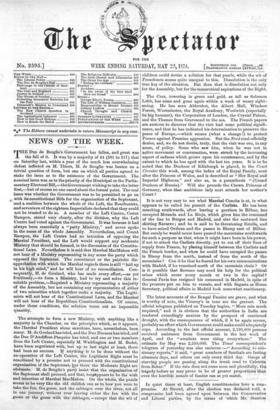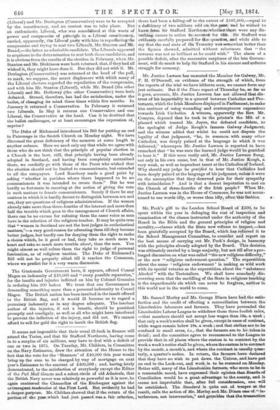In quiet times at least, English constituencies love a com-
promise. At Stroud, after the election was declared void, a compromise had been agreed upon between the Conservative and Liberal parties, by the terms of which Mr. Stanton
(Liberal) and Mr. Dorington (Conservative) were to be accepted by the constituency, and no contest was to take place. But an enthusiastic Liberal, who was scandalised at this waste of power and compaomise of principle in a Liberal constituency, carried, apparently, the Liberal party with him in repucfiating the compromise and trying to seat two Liberate, Mr. Stanton and Mr. Brand,—the latter an admirable candidate. The Liberals appeared to acquiesce in the determination to seat both these candidates, and it is obvious from the results of the election in February, when Mr. Stanton and Mr. Dickinson were both returned, that, if theyhad all wished it, they might have done it. But they did not wish it. Mr. Dorington. (Conservative) was returned at the head of the poll, to mark, we suppose, the secret displeasure with which many of the Liberal electors regarded the repudiation of the compromise, and with him Mr. Stanton (Liberal), while Mr. Brand (the other Liberal) and Mr. Holloway (the other Conservative) were both defeated. Stroud, therefore, has had the satisfaction, under the ballot, of changing its mind three times within five months. In January it returned a Conservative. In February it returned two Liberals. In May it returns one Conservative and one Liberal, the Conservative at the head. Can it be doubted that the ballot enc-ourages, or at least encourages the expression of, caprice?



































 Previous page
Previous page